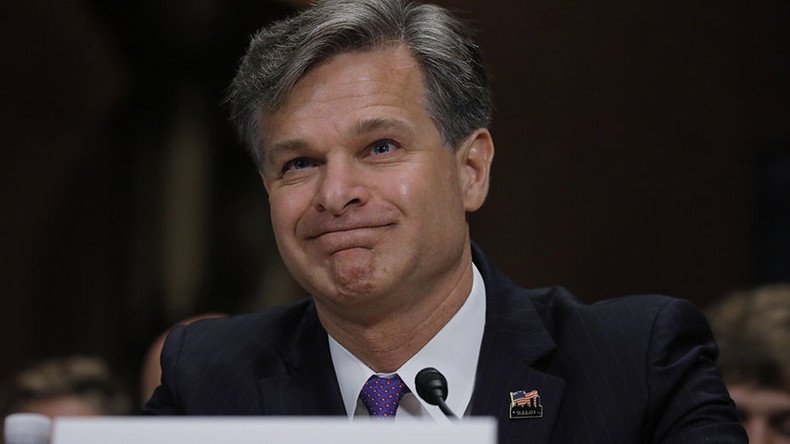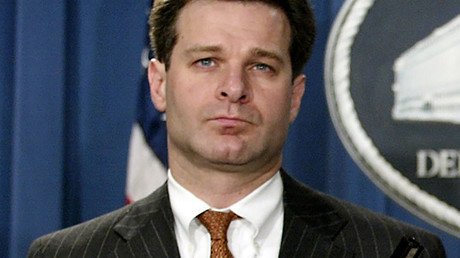‘By the book’: FBI nominee Wray vows independence & resolve

Christopher Wray, President Donald Trump’s nominee to head the FBI, appears to have secured the support of both Democrats and Republicans on the Senate Judiciary Committee after assuring them he would be independent and resolute as the nation’s top cop.
Introducing him to the committee on Wednesday, former Senator Sam Nunn (D-Georgia) described Wray as someone with an “unwavering commitment to the rule of law,” a sentiment the former Justice Department official repeated multiple times over the course of the four-hour hearing.
“Appropriate” was the word that came up a lot during the hearing, mainly used by Wray to describe how he would act in various hypothetical scenarios the senators proposed based on the behavior of his predecessor, James Comey.
“Nobody asked me for a loyalty oath, and I didn’t offer one,” Wray said on several occasions, adding, “My loyalty is to the Constitution and the rule of law.”
“I believe to my core that there’s only the one right way to do this job, and that is with strict independence, by the book, playing it straight,” Wray told Senator Chuck Grassley (R-Iowa), the committee chairman. “Without fear, without favoritism, and certainly without regard to any partisan political influence.”
He also assured the senators that he would push back on any inappropriate suggestions or directives from the administration, saying that a lot of his career “has consisted of telling people what they didn’t want to hear and talking people out of bad ideas.”
While he disagreed with Trump’s characterization of Comey as “a nut job,” Wray took issue with the previous director’s conduct of the Hillary Clinton email investigation, in particular the July 2016 press conference in which Comey announced there would be no charges.
“If you collapse prosecutor and investigator into one role, it’s just one step from having the judge, jury and executioner all in one,” Wray told Sen. John Cornyn (R-Texas).
Wray also took a hard line on protecting classified information, telling the senators that many of the sources and methods used by the US intelligence community come from outside partners, and that leaks risked the allies losing their faith.
If intelligence dries up as a result, “we’re in a world of hurt,” he said.
#FBI director nominee Christopher Wray to @LindseyGrahamSC: "I do not consider Director Mueller to be on a witch hunt." #WrayHearingpic.twitter.com/kbEUdXcmk9
— CSPAN (@cspan) July 12, 2017
While he has only read the public version of the January 2017 intelligence report blaming Russia for interfering in US elections, Wray said he had “no reason to doubt” the assessment. Likewise, he said he does not consider the former FBI director and now special counsel Robert Mueller to be on a “witch hunt” against the Trump administration.
“This is not a job for the faint of heart, and I can assure this committee, I am not faint of heart,” Wray said. “No one should mistake my low-key demeanor as a lack of resolve.”
Several senators had questions for Wray about his role in reviewing a 2004 Justice Department memorandum on interrogation techniques that have been termed torture. He denied reviewing such a document, much less giving it his blessing.
“My view is that torture is wrong, it’s unacceptable, it’s illegal, and I think it’s ineffective,” he said.
Wray also said that Muslim-Americans provided “some of the best leads we ever got” during his time in the Bush administration’s war on terrorism, and that he wanted to push for earlier detection of terrorist plots.
FBI director nominee Christopher Wray: "My view is that torture is wrong. It's unacceptable. It's illegal and I think it's ineffective." pic.twitter.com/wQSE17QylF
— CSPAN (@cspan) July 12, 2017
The New Yorker and Yale graduate also spoke in favor of stricter gun controls ‒ if appropriate ‒ and cracking down on hate crimes, corruption and cyber threats. He noted that the controversial Section 702 surveillance was enacted after he left the DOJ in 2005, but that he favored reauthorizing it based on the comments of law enforcement and intelligence officials.
Wray declined to comment on the story involving the president’s son, Donald Trump Jr., meeting with a Russian lawyer last summer, telling the senators that he hasn’t even seen the news coverage, having been busy visiting the committee members on Tuesday when the story broke.













